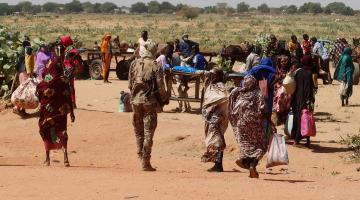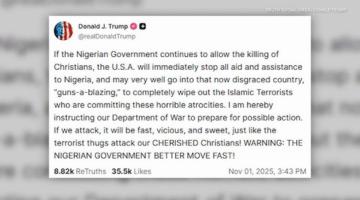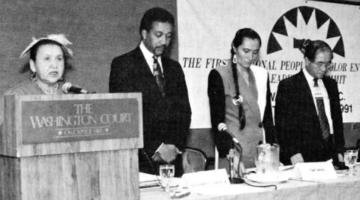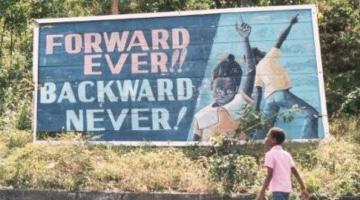The commercializing of the military and police is central to the selling of sports today, and protesting either has turned the athlete into an enemy of the state.
“If you’re rich, you can be president. But if you’re black, they want you to ‘shut up and dribble.’”
In this series, we ask acclaimed authors to answer five questions about their book. This week’s featured author is Howard Bryant. Bryant is a senior writer for ESPN.com and ESPN The Magazine and appears regularly on ESPN programming. His book is The Heritage: Black Athletes, a Divided America, and the Politics of Patriotism.
Roberto Sirvent: How can your book help BAR readers understand the current political and social climate?
Howard Bryant: The Heritage is all about the collision of post-9/11 patriotism and nationalism in sports and the revival of the political athlete post-Ferguson. It is not a history book retracing the steps of black athletes who took a stand during civil rights or times of injustice but more a discussion that deconstructs the fiction that athletes have ever “stuck to sports.” The black athlete has never been afforded the luxury of not being political because they are the most importantly and influential black employees in the 20thcentury. They were the first ones with access to the private schools, the prestigious universities. They were the ones who integrated neighborhoods and made the real money. Since World War II, the price of being out front was to speak. And players who did not (Tiger Woods, Michael Jordan) could not escape the reputation of not doing enough for the community.
What do you hope activists and community organizers will take away from reading your book?
I hope they recognize what has happened to American sports over the past 17 years, and that nothing the players have done -- taking a knee against police brutality, protesting at stadiums -- can be viewed properly without the lens of 9/11, where sports leagues began to embed the presence of the police and the military into sporting events that are ostensibly apolitical. The NBA, NFL, NCAA, NASCAR, MLB, NHL and the rest made a post-9/11 decision to partner with the Pentagon to add flags and flyovers and military tributes into sporting events and the result was a chilling effect on player activism. In post-9/11 America, player activism is now seen as anti-military, anti-America, in large part because teams now sell team memorabilia in camo designs. The commercializing of the military and police is central to the selling of sports today, and protesting either has turned the athlete into an enemy of the state.
We know readers will learn a lot from your book, but what do you hope readers will un-learn? In other words, is there a particular ideology you’re hoping to dismantle?
The general un-learning The Heritage attempts to achieve is the notion that dissent is unpatriotic, that the notion of “stick to sports” was always a fallacy, and that the black athlete should be free as all famous people are in America, to use their voice to advocate for black people.The players should know that this platform is their inheritance and cannot be taken from them in any climate, especially one as hostile as what we’re living in today. In America, people listen to rich people. If you’re rich, you can be president. But if you’re black, they want you to “shut up and dribble.”
“The black athlete should be free as all famous people are in America, to use their voice to advocate for black people.”
It also hopes to be the corrective for the idea that the black brain in America will always be secondary to the black body. That is the dynamic that sports was supposed to transition the black male through access to education because of their sports ability. But today we see players being uncompensated in college -- and emerge with no education, either. So they go as far as their bodies take them. Some are taken to the professional ranks and millions of dollars. Most others are taken to a job at the Home Depot after suffering a knee injury.
Who are the intellectual heroes that inspire your work?
There are too many to count. James Baldwin, obviously. David Halberstam. Dr. Harry Edwards, Toni Morrison, Claudia Rankine, just to name a few. This was an emotional project in that it was borne out of watching the change in the how sports was being sold to the public combined with what was happening in America post-Ferguson. There was so much powerful writing and thought on the subject that I knew I had something to say. I think Claudia Rankine’s “Citizen” really encouraged me to shape my thoughts and try to say something.
I was taken during this period, really inspired by “Citizen” to reassess the road we’ve traveled and question what, exactly, we as African Americans have accomplished if at this late date we have abdicated our identities for money, run from our heritages because of fear of being criticized. How much, I wondered, had we really moved forward?
In what way does your book help us imagine new worlds?
Certainly The Heritage should return us to an older attitude where speaking on behalf of African Americans should neither be remarkable nor heroic. The new world I hope we imagine is the old one, before the forty years of OJ Simpson, Michael Jordan and Tiger Woods shifted the allegiance of the athlete to the corporations and not to the needs of the people whom black players once represented on social and political issues.
And it is my hope also, that perhaps the public, but especially the players will recognize that their inheritance is not only to speak on behalf of the less fortunate but also to hold these billion-dollar institutions (the colleges and universities, really) to their mission of educating these bodies that generate enormous sums of revenue for them.
Roberto Sirventis Professor of Political and Social Ethics at Hope International University in Fullerton, CA. He also serves as the Outreach and Mentoring Coordinator for the Political Theology Network. He’s currently writing a book with fellow BAR contributor Danny Haiphong called American Exceptionalism and American Innocence: The Fake News of Wall Street, White Supremacy, and the U.S. War Machine.
COMMENTS?
Please join the conversation on Black Agenda Report's Facebook page at http://facebook.com/blackagendareport
Or, you can comment by emailing us at comments@blackagendareport.com



















